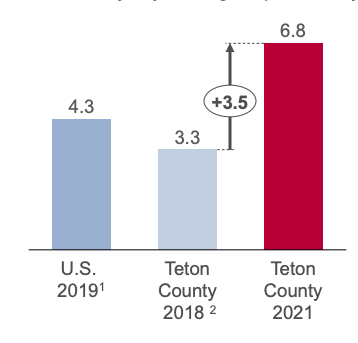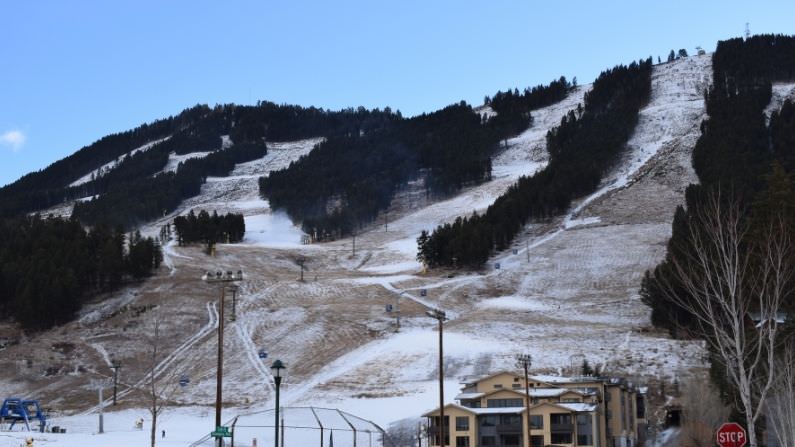Mental Health Issues are Front and Center for Jackson Locals
Behavioral Health–that’s the combination of mental health and substance use–was front and center at Monday’s Joint Information Meeting between town and county elected officials. A recent survey conducted over five months found that the overall mental health of Teton County residents has decreased dramatically in recent years. Abby Ridgeway, a consultant who helped conduct the questionnaire of over 1,000 locals, said the average resident reports about seven poor mental health days every month–an increase from about three in 2018 and several days above the national average.

The number of “poor” mental health days Teton County residents experience per month has increased dramatically in recent years. (Screenshot Courtesy of the 2021 Behavioral Health Needs Assessment)
“I often like to say, people think of behavioral health as other people’s problems. And I think we’re now at a place in Teton County where this is every other person,” Ridgeway said. “Meaning it’s one out of two people, or 50% of people are saying they need some kind of health service.”
Since the pandemic started, locals report being lonelier and more prone to binge drinking. And that’s particularly true for younger folks and people of color. Access to care for lower-income folks also remains a barrier for people seeking the help they need, and Ridgeway said the economic realities of Jackson Hole–things like a lack of affordable housing–lead to poor mental health outcomes in general for much of the population, and severe, crisis-level situations for a growing number of people.
“Because of some of our economic instability and some of the different cultural dynamics, a sense of belonging in our community is not guaranteed,” Ridgway said. “And in fact, many people are experiencing a lack of those strong community connections and support networks.”
In response to this data, a coalition of human services providers is looking into opportunities for how to improve behavioral healthcare in Jackson Hole. They’re implementing new programs already but plan on returning to local electeds early next year to talk about specific policy and funding recommendations.
First/Last/Deposit Program Will Move Forward Without Government Support
The nonprofit organization One22 recently launched a housing assistance pilot program intended to help applicants find more secure housing. The first/last/deposit tool would pay for up to 70% of people’s major first check they send to a landlord–including first and last month’s rent and security deposit, which can be a large chunk of change and a barrier for many folks. Jackson/Teton County Affordable Housing Director April Norton said during a meeting with local electeds Monday that the program offers up to $3,000 for individuals, or double that for families.
“We know that there are many, many individuals and families who are either living in unstable housing or they’re living in housing where they are extremely cost-burdened,” Norton said. “That means they’re paying more than 30% of their income towards housing. But many of these families are paying more than half of their income towards housing every month.
Six local households have already found better rental situations through this program, which started in October. However, One22 and the local housing authority now want the government to get involved, by spending $50,000 of taxpayer money on a pilot program that would allow more people to test first/last/deposit and see if it’s effective and worthy of more investment in the future. Norton pleaded the case for why she needs funding now, but received a lot of concerns and questions from elected officials.
“We have such a dearth of rental housing that it is a landlord’s market,” she said. “We talked about all of these issues, and we kept coming back to this as a pilot. We want to learn. We want to understand how it will work going forward.”
The Town Council voted yes to fund this program, but the county commissioners voted 3-2 narrowly against it, although at least one representative wants to reconsider the decision. So, One22 will move forward with applications and the program while its funding is uncertain, and the issue will likely be revisited in the coming months.
Snowpack Low Across the Region
December has arrived, but in much of the West, snowfall has not. Snowpack numbers in every part of the Colorado River basin are lower than average for this time of year.
In most parts of Utah, Arizona, and New Mexico, snowpack is only around a quarter or a third of normal. Numbers are a little better to the north, where much of Colorado and Wyoming have about half as much snow as normal. Climate scientists say there’s plenty of time left for conditions to improve, but they’re watching these totals closely. Low snowpack means more than just meager skiing, it can have serious repercussions for the Colorado River. Water that supplies 40 million people throughout the Southwest starts as winter snow in the Rockies. As the basin endures more than two decades of drought, cities and farms throughout the region can’t afford another dry winter.
Alex Hager of KUNC of Greeley, Colorado, contributed reporting to this segment.
CES Faces Funding Challenges
Program Director for the Jackson Branch of Community Entry Services Carolyn Worth said in a meeting with Teton County electeds Monday that she needs help from local officials by the first of the year. She said ten out of her 16 staff positions will be unfilled by then.
“We are going to be forced to make some very difficult decisions that could include drastic cuts in programming, consolidating our group homes and, in the absolute worst-case scenario, discharging clients,” Worth said.
CES currently only has enough funding to pay employees $15 an hour, which Worth said is not nearly enough in an area with such an expensive cost of living. So, Worth is asking for emergency cash so that they can offer workers $20 an hour.
Learn more about the struggles with CES here.
Federal Dollars to Help Wyoming
The State of Wyoming is about to get a huge chunk of change courtesy of the federal government. Nearly $1.6 billion of American Rescue Plan funding will be heading to the Cowboy State in the next few years, and Governor Mark Gordon is finalizing his plan to spend that money. At a virtual town hall last week, Gordon’s policy director Renny MacKay introduced some of the state’s largest values and needs, as well as how these federal dollars can help.
“At the core of what we’re talking about is the strategy that the governor laid out at the goal level, and that was to help Wyoming drive towards a future where its citizens will thrive,” MacKay said.
Broadband infrastructure, mental health providers, public education systems, workforce development programs and more could all get boosts. In fact, there’s already $3 billion worth of proposals for what to do. Now the challenge is how to spend it, and that’s what the Wyoming legislature, the governor and his team, and towns and counties across the state will be figuring out over the next few months.
Members of the public are also encouraged to check out the specifics of the proposals and give public comments on what matters to them, at drivethrive.wyo.gov.
More Local Campsites Moving to Online Reservations
Several more Grand Teton National Park area campgrounds will transition to an online reservation system next summer through Recreation.gov. The sites are the Colter Bay RV Park and Tent Village, and the Headwaters Campground and RV Park, which were previously booked through the Grand Teton Lodge Company. Public affairs specialist for the park C.J. Adams said it’s all part of adapting to exploding visitation and encouraging tourists to plan ahead.
“The reason that we’re pushing a reservation system is that it takes a lot of the guesswork out of arriving to the park and not knowing where you’ll be able to stay,” Adams said. And we, believe it or not, are already about six months out from when many of these campgrounds will be opening for the 2022 season. So, make those reservations early and make them now.”
Most of the park’s campgrounds will book up on a six-month rolling basis, but Adams also said a limited number of sites will be reserved at the Colter Bay and Gros Ventre campgrounds for booking two weeks out.
Biden Mandates Face Further Setbacks
A federal judge in Georgia temporarily blocked yet another of President Biden’s COVID-19 vaccine mandates on Tuesday–this time for federal contractors and subcontractors. Gov. Mark Gordon took credit for the judge’s ruling, since Wyoming was among the states who sued to challenge the mandate. Sen. John Barrasso also discussed his opposition to vaccine mandates on FoxBusiness Tuesday.
“I will tell you I am pro-vaccine but anti-mandate. To me, the mandate is a massive overreach by the government. By this administration. And so far the courts agree with me,” he said.
White House spokeswoman Jen Psaki defended the proposed mandates Tuesday and said the administration is still confident in its legal ability to make them happen–although all three major mandates are currently blocked by federal courts.






